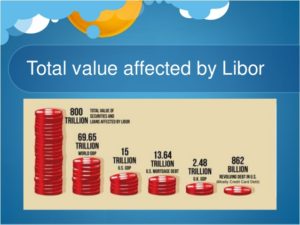
Last year it was announced that Libor will be phased out by 2021. Why is this such big news? According to a fed survey almost 45% of mortgages are linked to Libor and the vast majority of jumbo loans are Libor based. In total there is about 862 billion in short term debt in the US linked to libor (credit cards, car loans, etc…) With the index going away what does this mean for mortgages and your wallet? Last week the replacement rate for Libor debuted, SOFR (secured overnight financing rate). What does this mean for your real estate financing / payments?
First, why is Libor going away? Libor stands for London Interbank Overnight rates, it is supposed to be like the US treasury overnight rate. During the last financial crisis Libor was rigged. This occurred as traders intentionally swayed the rate so that they could profit. Libor is not a market rate, it is a reported rate by various banks as opposed to the fed funds rate which is based on actual market transactions. After the rigging of Libor, changes were made that never fully brought back the volume to Libor, this thin volume has basically doomed the index.
“The impact of this decision from the FCA is to put uncertainty into all Libor-based swap rates,” said Peter Chatwell, head of European Rates Strategy at Mizuho International Plc in London. “The market will need guidance as to what a replacement could be and this will lead to increased volatility and possibly reduced liquidity in the near term.”
Why will a bank stop issuing Libor instruments? Libor is an index. When a security is issued (like a mortgage or other instrument) there is spread (i.e. Libor +250) that allows the rate to float. This takes out interest rate risk to the security purchaser/holder. For example, a mortgage would reset based on fluctuations in Libor. This would ensure that the bank would not have to absorb an increase in rates which would in turn reduce their profit. I suspect lenders will stop issuing Libor based mortgages/securities since there is great uncertainty as to what replaces Libor and there is uncertainty in the markets of how to price this risk. For example, what happens on an adjustable rate mortgage that resets in 6 years from now? There is nothing in the mortgage highlighting an alternate rate or spread.
The federal reserve in April debuted SOFR (secured overnight financing rate). SOFR was selected by the Alternative Rate Committee as the replacement for dollar-based Libor. The new rate is based on actual cash overnight transactions collateralized by US treasuries (as opposed to opinions like Libor) and is calculated daily by the federal reserve bank of New York. This all sounds great, but there is a problem. In the first two weeks it was discovered that the rate was calculated improperly. Certain transactions were included that should not have been therefore altering the rate. If you had a SOFR based instrument this means your rate could have been higher or lower than actuality due to erroneous data. It is going to take a while for all the bugs to get worked out of the new rate.
SOFR does not track Libor. During its debut SOFR was 1.8% and LIBOR was 1.6%. Remember that Libor is used as the benchmark on billions in loans. Many large institutions have lines based on Libor along with mortgages, etc… Assume a company had a 50-million-dollar line. This slight difference in Libor and SOFR would cost them over 100k a year. This raises the question if SOFR does not track LIBOR exactly who eats the rate difference?
What will happen to Libor based instruments? This is the biggest question since billions are tied to this index including many mortgages. Furthermore, I took out an adjustable rate mortgage based on Libor that is not resetting for another 6 years. Here are some options:
- Litigation: This is the only certainty of the 4 options! Once instruments start to reset there will be some major class action lawsuits that will set the precedent for how LIBOR based contracts will be handled. I suspect this litigation will go on for years like the mortgage crisis that has taken over 10 years to resolve.
- Adoption of SOFR as is: Some banks likely will adopt the new rate and basically substitute SOFR for the LIBOR index. With preliminary data SOFR is higher than LIBOR so borrowers will have increased borrowing costs on existing contracts that are LIBOR based
- Adoption of SOFR with some change index: Once enough time has passed there might be a trend that emerges that shows a relatively consistent spread between LIBOR and SOFR. For example, if SOFR is consistently .2% higher than Libor, then the spread would be adjusted to make the change to SOFR more equitable.
- Adoption of some other metric: If SOFR doesn’t get the market acceptance and volume to make it a reliable metric yet another index could be used for example the EURO is developing a transaction based overnight rate.
Although nobody really knows how the transition from LIBOR to an alternative rate will go, I can guarantee the change will impact millions of borrowers throughout the United States. The chosen adoption of the new rate could substantially raise borrowing costs. Will you now pay more on your mortgage or lines?
Resources/References/Additional Reading
- https://www.fairviewlending.com/libor-going-away-impact-on-mortgages/
- https://www.newyorkfed.org/medialibrary/media/newsevents/speeches/2017/Frostpresentation.pdf
- https://www.bloomberg.com/news/articles/2018-03-26/america-s-libor-replacement-is-ready-for-its-debut-quicktake
- https://bankingjournal.aba.com/2017/12/fed-to-publish-libor-replacement-rate-starting-in-q2-2018/
- http://www.businessinsider.com/a-new-benchmark-rate-is-replacing-libor-heres-what-you-need-to-know-2018-4
- https://www.forbes.com/sites/forbesnycouncil/2018/04/19/goodbye-libor-hello-sofr/#76106886717d
- https://www.bloomberg.com/news/articles/2018-04-16/u-s-libor-replacement-two-weeks-after-debut-has-some-issues
